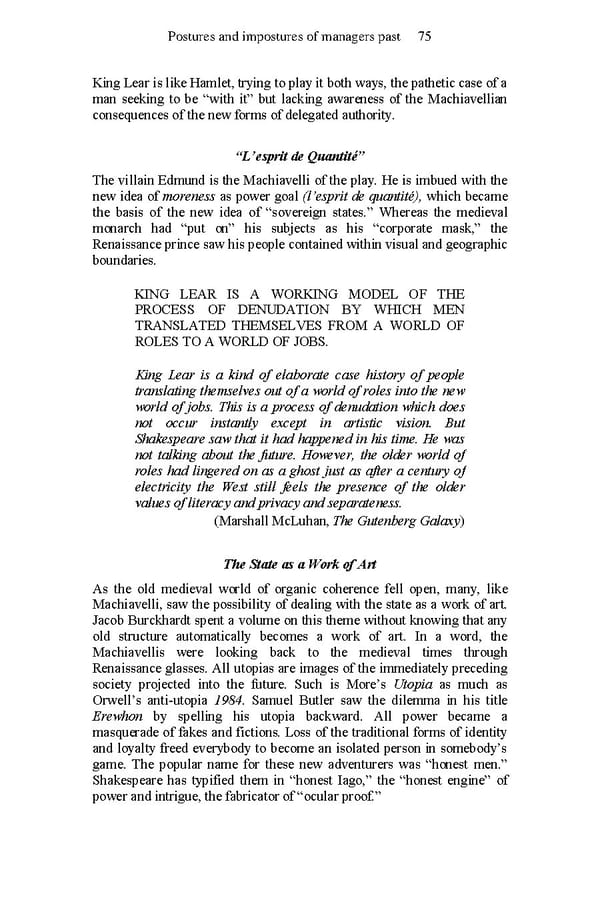Postures and impostures of managers past 75 King Lear is like Hamlet, trying to play it both ways, the pathetic case of a man seeking to be “with it” but lacking awareness of the Machiavellian consequences of the new forms of delegated authority. “L’esprit de Quantité” The villain Edmund is the Machiavelli of the play. He is imbued with the new idea of moreness as power goal (l’esprit de quantité), which became the basis of the new idea of “sovereign states.” Whereas the medieval monarch had “put on” his subjects as his “corporate mask,” the Renaissance prince saw his people contained within visual and geographic boundaries. KING LEAR IS A WORKING MODEL OF THE PROCESS OF DENUDATION BY WHICH MEN TRANSLATED THEMSELVES FROM A WORLD OF ROLES TO A WORLD OF JOBS. King Lear is a kind of elaborate case history of people translating themselves out of a world of roles into the new world of jobs. This is a process of denudation which does not occur instantly except in artistic vision. But Shakespeare saw that it had happened in his time. He was not talking about the future. However, the older world of roles had lingered on as a ghost just as after a century of electricity the West still feels the presence of the older values of literacy and privacy and separateness. (Marshall McLuhan, The Gutenberg Galaxy) The State as a Work of Art As the old medieval world of organic coherence fell open, many, like Machiavelli, saw the possibility of dealing with the state as a work of art. Jacob Burckhardt spent a volume on this theme without knowing that any old structure automatically becomes a work of art. In a word, the Machiavellis were looking back to the medieval times through Renaissance glasses. All utopias are images of the immediately preceding society projected into the future. Such is More’s Utopia as much as Orwell’s anti-utopia 1984. Samuel Butler saw the dilemma in his title Erewhon by spelling his utopia backward. All power became a masquerade of fakes and fictions. Loss of the traditional forms of identity and loyalty freed everybody to become an isolated person in somebody’s game. The popular name for these new adventurers was “honest men.” Shakespeare has typified them in “honest Iago,” the “honest engine” of power and intrigue, the fabricator of “ocular proof.”
 Essential McLuhan Page 81 Page 83
Essential McLuhan Page 81 Page 83